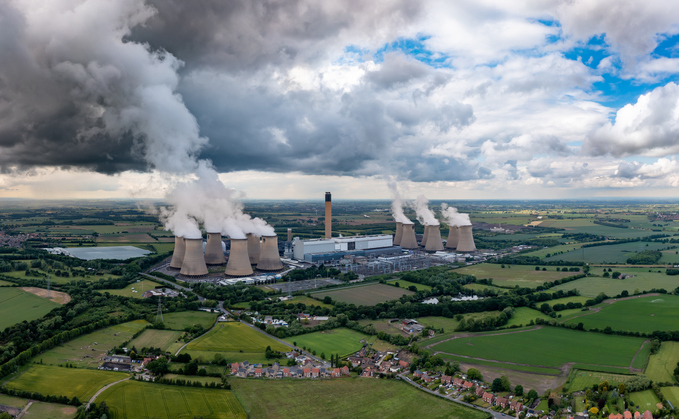
A new player has arrived in the carbon removal industry, and it’s already making waves. Elimini, a subsidiary of Drax Group, has officially launched with ambitious plans to deliver large-scale carbon removal while producing 24/7 renewable power.
The company’s focus on bioenergy with carbon capture and storage (BECCS) positions it as a critical player in addressing climate change and global energy needs.
>> RELATED: Introducing Elimini: New Carbon Removal Leader Launches at New York Climate Week

A Strong Foundation
Elimini begins its journey backed by a network of partners, investors, and suppliers. Offtake agreements for carbon removal credits are in place with companies like Ultrabulk, Holborn Trading, Karbon-X, ClimateTrade, and C-Zero Markets.
Sustainably sourced woody biomass for its BECCS operations will come from Manulife Investment Management and Molpus Woodlands, ensuring Elimini's supply chain aligns with its sustainability goals.
The company has also fostered academic partnerships with institutions like the University of Texas and the University of Houston to enhance its carbon management capabilities.
Support extends to programs such as Mission Innovation and scholarships for forestry students at Arthur Temple College of Forestry and Agriculture. This collaborative approach reflects Elimini’s commitment to advancing innovation while building a knowledgeable workforce for the future.
Leading with Expertise
To steer its efforts, Elimini has established an advisory council featuring prominent names in the carbon removal industry. Members include David Hill, former General Counsel to the DOE; Miranda Ballentine, Founding CEO of the Clean Energy Buyers Association; and Melissa Lott, a professor at Columbia Climate School.
This diverse group will provide strategic guidance as Elimini scales its operations.
Highlighting the company’s vision, Will Gardiner, Executive Chair of Elimini and CEO of Drax Group, stated: “Carbon removals are desperately needed to reverse the legacy emissions warming our planet—and that industry represents more than a $1 trillion opportunity once it reaches gigaton scale.”

>> In Other News: Climate Tech Startup Kapture Successfully Embeds Carbon Emissions in Concrete
BECCS in Action
Elimini’s first greenfield BECCS project is already under construction in the U.S. Southeast.
BECCS technology not only captures and stores carbon dioxide during biomass conversion but also generates reliable renewable energy.
By addressing both energy needs and carbon removal, BECCS plays a dual role in advancing sustainability while powering industries and communities.
As explained by John-Paul Backwell, CEO of Elimini: “This transaction marks a significant milestone in the evolution of Fusion Fuel’s business, providing the scale, synergies, and expertise needed to drive growth and deliver exceptional value to our stakeholders.”
The Growing BECCS Market
Recent data shows BECCS is leading the carbon removal space, accounting for 90% of transactions by volume in Q2 2024.
Of the 4.8 million tonnes of carbon dioxide removed globally during that period, BECCS contributed 4.3 million tonnes.
This dominance highlights BECCS’s scalability and growing acceptance as a key solution for addressing climate change.
DNV, a global assurance leader, recently validated a BECCS certification methodology developed with Drax and Stockholm Exergi.
This milestone ensures that BECCS credits meet high-quality standards, offering corporate buyers confidence in their climate impact investments.
Why BECCS Matters
BECCS stands out for its ability to achieve net-negative emissions while producing continuous renewable energy. Unlike traditional carbon capture and storage (CCS), which reduces emissions, BECCS actively removes CO2 from the atmosphere.
By providing both environmental and energy benefits, BECCS is uniquely positioned to support industries like aviation, shipping, and manufacturing in their decarbonization efforts.
The technology begins with sustainably managed forests that absorb CO2 as they grow.
Biomass sourced from these forests is converted into energy, with carbon dioxide captured and stored underground. This process generates carbon credits, which can offset emissions for hard-to-abate industries.
Timing Is Everything
With global demand for energy soaring—fueled by electrification, data centers, and AI workloads—there’s never been a better time to invest in BECCS.
The International Energy Agency (IEA) has identified the technology as essential for achieving decarbonization targets by 2050.
Elimini enters the market at a pivotal moment, offering a solution that balances energy security, growing power demand, and climate goals.
As BECCS continues to dominate carbon removal discussions, Elimini’s strategic approach and industry partnerships position it as a key player in shaping a sustainable future.
Subscribe to the newsletter
Daily decarbonization data and news delivered to your inbox
Follow the money flow of climate, technology, and energy investments to uncover new opportunities and jobs.
Latest issues
-
This $4.1M Deal Could Change Carbon Capture's Playbook
Inside This Issue 🗜️ CarbonQuest Lands $4.1M Alberta Deal on Gas Compressors 🛡️ CADO, 123Carbon, and Assure SAF Registry Join Forces to Tackle SAF Integrity Gaps ✈️ ISCC, OMV, and Airbus Partner t...
-
Can Koloma Crack Iowa's Billion-Year-Old Secret?
Inside This Issue ⛏️ Iowa's Hydrogen Rush: Can Koloma Strike Gold Before Rules Kick In? ✈️ Bentley Commits to Use 100% Sustainable Aviation Fuel for Car Airfreight 🌬️ Minister Parrott Provides Upd...
-
$47M Just Poured Into This SAF Producer
Inside This Issue 💰 LanzaJet Announces $47M in New Capital and First Close of Equity Round at $650M Pre-Money Valuation 🚢 Maersk's Ethanol Bet Could Reshape U.S. Fuel Markets 🪨 Canada Nickel and t...
Company Announcements
-
Feedstocks are Perennial Grasses and other Renewable Biomass Sources FREDERICK, Md., Feb. 18, 2026 /PRNewswire/ -- Do you know why passenger and freight planes are not using renewable biofuel? It'...
-
Vancouver, British Columbia--(Newsfile Corp. - February 25, 2026) - Q Precious & Battery Metals Corp. (CSE: QMET) (OTC Pink: BTKRF) (FSE: 0NB) ("QMET" or the "Company") congratulates Quebec Inn...
-
Carbon Direct and C2X Announce Collaboration on Pioneering Forestry Residue-to-Biofuel Project
Collaboration on C2X’s Beaver Lake Biofuels project advances biomass carbon removal and storage as a scalable climate solution, transforming Louisiana’s forestry and sawmill residues into biofuel a...
-
Carbon Direct and C2X Announce Collaboration on Pioneering Forestry Residue-to-Biofuel Project
Collaboration on C2X’s Beaver Lake Biofuels project advances biomass carbon removal and storage as a scalable climate solution, transforming Louisiana’s forestry and sawmill residues into biofuel a...